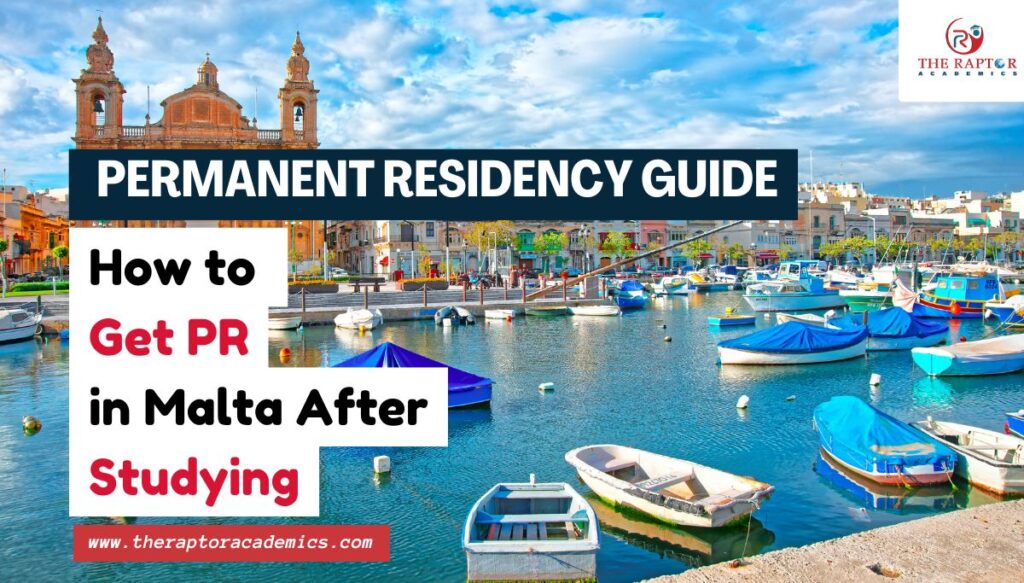Introduction
Dreaming of turning your student journey into a lifelong European adventure? Malta is not only a beautiful island with world-class education, but also a strategic gateway for international students to settle in the EU. With its growing economy, welcoming culture, and affordable education system, Malta has emerged as a top study destination for Indian students.
Many students who start with short-term academic goals often consider building their careers in Malta after graduation. This is where the journey toward PR in Malta begins — offering long-term security, EU mobility, and access to a wide range of social and professional benefits.
At The Raptor Academics, we’ve helped hundreds of students secure their student visas, find the right course, and start their study journey in Malta. Now, we’re here to guide you through the next milestone — permanent residency. This guide will take you through every step needed to make Malta your permanent home.
Why Consider PR in Malta After Studying?
Securing PR in Malta opens the door to a high quality of life and a stable future in one of Europe’s most charming nations. Known for its Mediterranean climate, English-speaking population, and excellent public services, Malta offers an attractive lifestyle for graduates looking to stay on after their studies.
What makes Malta even more appealing is its access to the broader EU job market. As a PR holder, you can work and live with fewer restrictions, making it easier to advance your career across Europe. Plus, permanent residency often allows family reunification — enabling spouses and children to live with you.
For many international students, education is not just a degree—it’s a launchpad for something greater. Studying in Malta gives you that foundation. With the right planning, your student journey can evolve into a long-term, successful life in Europe.
Suggested Read: Best Highest Paying Part-Time Jobs for Students in Malta [2025]
Step-by-Step Guide to Get PR in Malta
If you’re ready to transform your student experience into permanent residency, follow this step by step guide to get PR in Malta:
Step 1: Graduate from a recognized Maltese institution
Whether you studied at the University of Malta, MCAST, or another top college, ensure your course is accredited. Your graduation is the first milestone toward establishing your eligibility. (Top 12 Universities in Malta 2025: Top Institutions, Courses, and Admission Guide )
Step 2: Apply for a post-study work visa
Upon completing your studies, apply for a 12-month extension to stay in Malta. This visa allows you time to seek full-time employment related to your field of study.
Step 3: Secure full-time employment
To move toward PR, you must find a job in Malta. Your employer should register you with JobsPlus, and your job contract must meet national wage and labor standards.
Step 4: Work continuously for at least 5 years
You must legally reside and work in Malta for five uninterrupted years. Short absences are permitted, but long breaks may reset your eligibility timeline.
Step 5: Fulfill integration and residency conditions
During your stay, you should integrate into Maltese society. Some programs may require basic knowledge of the Maltese language or local culture.
Step 6: Apply for permanent residence in Malta
Once you complete five years, apply through the Identity Malta Agency. Submit your documentation, pay the fees, and attend a biometric appointment. After approval, you’ll receive your PR card, opening a new chapter in your life.
Eligibility Criteria for Permanent Residency
To apply for permanent residence in Malta, international graduates must meet certain criteria that prove long-term commitment and stability. The most crucial requirement is a continuous legal stay of five years in Malta, primarily for employment, self-employment, or academic purposes.
Applicants must also demonstrate a stable and regular income that is sufficient to support themselves (and their family members, if applicable) without resorting to social assistance. Having a valid employment contract or proof of business activity is essential to showcase your financial independence.
Other mandatory requirements include proof of accommodation—either rented or owned—and comprehensive health insurance that covers medical needs in Malta and other EU countries. Fulfilling these requirements ensures that you are well-integrated into the country and ready to contribute as a long-term resident.
Documents Required for PR Application
Applying for PR in Malta involves gathering and submitting a detailed set of documents that support your eligibility. Below is the list of essential paperwork:
- Valid passport: Ensure it’s current with sufficient validity.
- Residence card: Proof of your legal stay in Malta.
- Proof of employment/income: Employment contract, salary slips, or business registration documents.
- Health insurance: Comprehensive coverage for both you and your dependents.
- Police clearance certificate: Issued by Indian authorities and/or Maltese police to confirm a clean legal record.
- Proof of accommodation: Rental agreement or property ownership.
- Language/integration certificate (if required): Some programs ask for proof of basic integration into Maltese society.
All documents should be in English or officially translated. Make sure they are up to date and meet the specific formatting guidelines mentioned on the Identity Malta portal.
PR Application Process & Timelines
The step by step guide to get PR in Malta begins with preparing and submitting your application through the Identity Malta Agency. You can either apply online via the portal or visit their office in person with your documentation.
Once submitted, the processing time typically ranges from 3 to 6 months, depending on the completeness of your application and workload at the agency. During this period, applicants might be called in for a biometric appointment, where your fingerprints and a photo will be taken for the residency card.
There’s also a processing fee involved, which varies slightly depending on your circumstances. After approval, you’ll receive a residency card valid for five years, which comes with a host of benefits like visa-free travel within the Schengen Area and access to public services.
Make sure to track your application status and respond to any requests from Identity Malta promptly.
Alternatives to Permanent Residency
If you’re not immediately eligible for permanent residence in Malta, there are still several residency options worth exploring:
- Malta Global Residence Programme: Ideal for non-EU nationals who want to live in Malta while paying a flat tax rate on foreign income. It requires property investment and minimum income criteria.
- Malta Nomad Residence Permit: Suitable for remote workers who want to reside in Malta while working for non-Maltese employers.
- Temporary Residence Extension: Students or graduates who need more time before applying for PR can extend their residence temporarily via post-study work permits or job-seeker visas.
- Citizenship by Naturalization: After holding PR for several years, you may apply for Maltese citizenship, provided you meet integration and residency requirements.
Each of these paths offers a stepping stone toward permanent residence in Malta, especially if you need more time to fulfill the 5-year legal stay requirement.
Tips to Increase Your Chances of Getting PR
Securing PR in Malta is achievable with the right approach and careful planning. Here are key tips to boost your chances:
- Maintain continuous legal residence: Avoid gaps in your stay. Always renew your residence permit on time and ensure your visa status is valid.
- Stay employed and pay taxes: Having a stable job and a clean tax record significantly strengthens your application.
- Engage with the local culture: Learning basic Maltese and showing cultural integration through community activities demonstrates your long-term commitment.
- Avoid legal issues: Even minor offenses or immigration violations can impact your PR eligibility.
Additionally, keeping all your documents updated and staying informed on immigration policies through the Identity Malta website or an expert consultant like The Raptor Academics can make a huge difference.
Being proactive from your student days can lay a strong foundation for a successful PR application.
Common Mistakes to Avoid
When applying for permanent residence in Malta, avoid these common pitfalls:
- Not renewing your residence permits on time can lead to an illegal stay, resetting your 5-year requirement.
- Employment gaps or lack of financial proof weaken your case for stable residence.
- Incomplete PR applications or missing documents often result in unnecessary delays or outright rejections.
- Failing to meet income or accommodation thresholds set by Identity Malta.
To avoid these mistakes, keep a checklist, plan ahead, and consult a professional advisor like The Raptor Academics to ensure your journey to PR remains smooth and compliant.
Final Thoughts
Gaining PR in Malta is not just a legal milestone—it’s a life-changing opportunity that opens doors to career growth, security, and EU mobility. If you start planning early—right from your student journey—you can build a strong foundation for long-term settlement.
Whether it’s choosing the right course, navigating the visa process, or preparing for your PR application, every step matters.
Looking to study and settle in Malta? Let The Raptor Academics guide you every step of the way—from admission to PR application! With our expertise, your dream of building a future in Malta can become a reality.
FAQs
1. Can I apply for PR in Malta right after finishing my studies?
No, to apply for PR in Malta, you must first graduate from a recognized Maltese institution and then secure a full-time job in Malta. After that, you need to work continuously for at least 5 years before you can apply for permanent residence.
2. How long does the PR application process take in Malta?
The PR application process in Malta usually takes around 3 to 6 months. After submitting your application, you may be required to attend a biometric appointment, after which your residency card will be issued once approved.
3. Do I need to speak Maltese to get PR in Malta?
While learning Maltese is encouraged to integrate into local society, it is not a strict requirement for permanent residence in Malta. However, having basic knowledge of the local language can enhance your chances of approval.
4. Can my family join me if I get PR in Malta?
Yes, when you secure permanent residence in Malta, you are eligible to apply for residency for your immediate family members (spouse, children, and dependent parents). This makes it easier for families to settle together in Malta.
5. What are the financial requirements for PR in Malta?
To qualify for PR in Malta, you must demonstrate a stable income from employment or business activities. Additionally, you need to provide proof of sufficient financial means to support yourself and any dependents. This typically includes proof of employment, a valid contract, and financial records.




